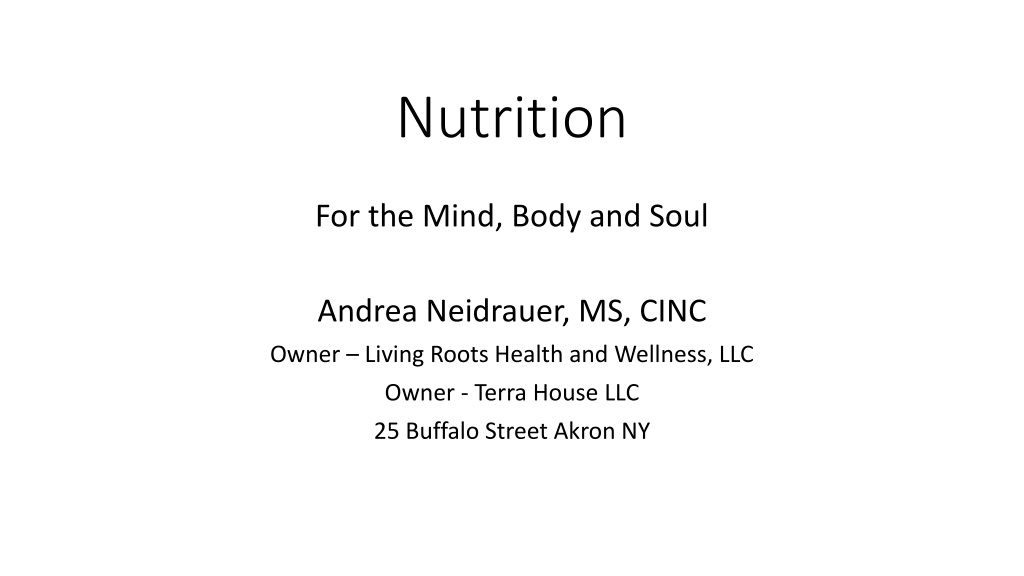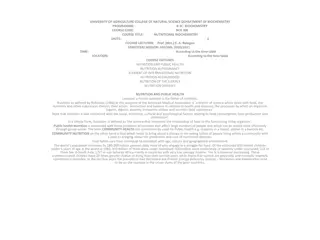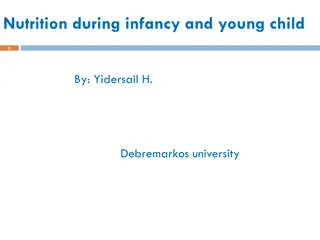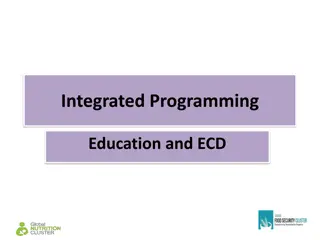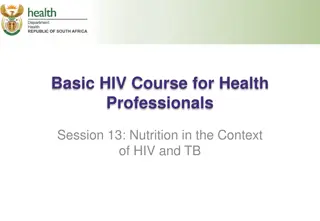Nutrition
Total wellness encompasses sleep, emotional well-being, physical activity, and nutrition. Adequate sleep is crucial for health, yet many struggle to meet recommended hours. Sleep deprivation impacts mood, behavior, performance, and overall health, affecting organ repair, muscle growth, hormone regulation, and memory. Emotional well-being is vital for physical health, emphasizing self-love and self-care.
Download Presentation

Please find below an Image/Link to download the presentation.
The content on the website is provided AS IS for your information and personal use only. It may not be sold, licensed, or shared on other websites without obtaining consent from the author.If you encounter any issues during the download, it is possible that the publisher has removed the file from their server.
You are allowed to download the files provided on this website for personal or commercial use, subject to the condition that they are used lawfully. All files are the property of their respective owners.
The content on the website is provided AS IS for your information and personal use only. It may not be sold, licensed, or shared on other websites without obtaining consent from the author.
E N D
Presentation Transcript
Nutrition For the Mind, Body and Soul Andrea Neidrauer, MS, CINC Owner Living Roots Health and Wellness, LLC Owner - Terra House LLC 25 Buffalo Street Akron NY
Four Components of Total Wellness Sleep Emotional Well-Being Physical Activity Nutrition All four of these must be balanced and working together. When one is off, the other will be off so it is imperative to take all into account Example, if I am not sleeping well, my activity levels will decrease. My body will also produce hormones that stimulate us to eat more. My brain is asking for high energy foods to get me moving and most people will turn to sugar for this .diets high in sugar are associated with weight gain and many chronic diseases such as cancer, heart disease, and diabetes
Sleep Adults ages 18 and over need 7 9 hours of sleep each night. Children need: 0 12 months 14 18 hours 1 2 years 12 14 hours 3 5 years 11 13 hours 6 10 years 10 11 hours 11 17 years 9 10 hours Less than 40% of American adults get the required amount of sleep for proper health The average American sleeps about 6 hours a night Less than 50% of American children get the required amount of sleep for proper health This is contributing to chronic health conditions
Why arent we sleeping?! We consume too much! Calories, light, sound and these all affect our sleep habits and our quality of sleep We see fatigue as a sign of weakness and combat it with stimulants I only need 5 hours of sleep each night! Coffee helps me get through the day! We confuse stimulating activities such as using electronics as rest
Sleep deprivation leads to: Affecting mood Affecting behavior Decreasing academic performance Decreasing athletic performance Decreasing immune function Increasing weight gain/obesity and related illnesses
While We Sleep Organs rest and repair Proteins are synthesized Muscles repair and grow Hormones are made and regulated Memory consolidation occurs Nutrients are distributed properly
Emotional Well-Being Self love, self care, emotional health are essential to physical health Improve mental health through Mindfulness Meditation Spiritual practices Healthy relationships Hobbies/creativity Gratitude Finding balance Connecting with nature
Physical Activity Cardiovascular Improves heart and lunch function and improves circulation Strength training increases muscle mass and bone density. Improves energy by increasing number of mitochondria in the cells. Flexibility Improves range of motion and reduces risk of injury Balance Improves body s ability to maintain equilibrium 30 + minutes per day of physical activity at least 5 days a week Try to incorporate activity from all four categories every week Yoga incorporates all four of these and is the only known form of physical activity to benefit all of our organ systems!
Physical Activity Cont Exercise safely don t push through injury or pain Avoid vigorous exercise every day, give your body time to heal Stretch before and after activities Fuel properly before and after Stay focused to avoid injury Sick of the routine! Think outside the box! Studies have shown individuals who do spontaneous physical activity improve mood by increasing endorphins! Try out your crazy dance sometime! Interval workouts have the same result.
Nutrition Nutrition I personally feel has the greatest effect on our overall health What we fuel our body with will significantly affect our health and wellness We are what we eat 85% of calories consumed in America are from processed foods These are significantly low in nutrients, high in chemicals, sugar and calories and are dramatically contributing to diseases such as cancer, heart disease, diabetes, stroke When we eat foods low in nutrients, our brain tells us to keep eating until we have gotten the amount of nutrients we need. This results in Americans eating over 2 x the amount of daily calories needed. I recommend focusing on nutrients not calories!
So what should I eat? Fruits and Vegetables!!! A variety of brightly colored produce Different colors offer different nutrients Try a new vegetable or fruit each month Visit farmers markets! Check out the dirty dozen and clean fifteen list to see which are high in pesticides Lean animal products and wild caught fish/seafood Humanly raised animal products. Animals that are raised in a stress-free natural environment produce cleaner meat/eggs/dairy that is much higher in nutrients. Choose natural sugars such as honey, maple syrup, agave Nuts and legumes Whole grains Quinoa, oats, whole wheat, brown rice Avoid foods that are enriched and fortified! Whole Grain should be in the ingredients
What should I steer clear from? Soda, energy drinks, excessive caffeine, alcohol Refined sugar Overly processed foods: if it has ingredients you can t identify, stay away! Food dyes, artificial ingredients
On a budget? Eating foods that improve our health, reduce our healthcare costs When we consume foods low in nutrients, we eat more this ends up costing the consumer twice the amount in food Eat at home! It s cheaper and better for your health Look for sales, try frozen produce, join wholesale clubs, buy in bulk and freeze
